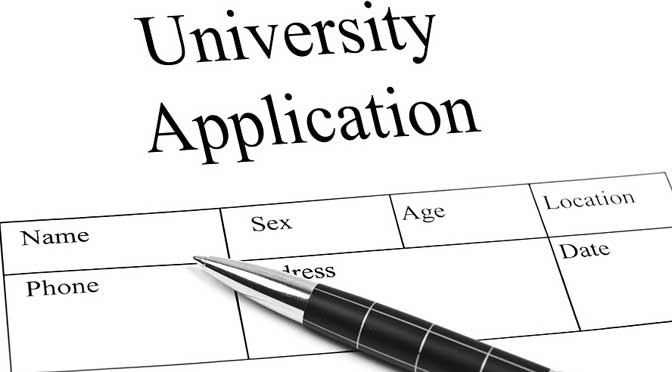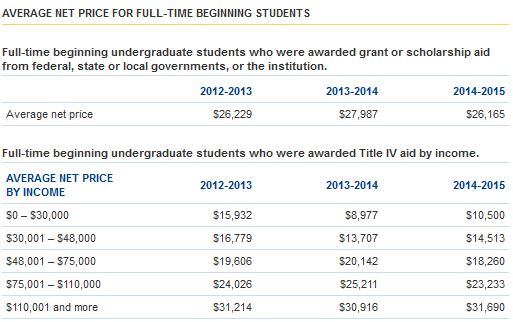 The first of the Early Decision college admissions deadlines are approaching and students are nervously revising their college application essays. However, before they submit their applications, they need to remember that there are reasons why people criticize Early Decision as primarily benefiting rich kids. As students make one final review of their application, they should make sure they know the following three things about Early Decision.
The first of the Early Decision college admissions deadlines are approaching and students are nervously revising their college application essays. However, before they submit their applications, they need to remember that there are reasons why people criticize Early Decision as primarily benefiting rich kids. As students make one final review of their application, they should make sure they know the following three things about Early Decision.
Admissions
5 Ways to Get Smart About Filling Out College Applications
 Filling out college applications is just one step of the college search process. But students and families quickly find out that this one step isn’t as simple as you might think. And there is a lot advice out there on how you should complete the college application process. Before you swamp yourself in page after page of internet search results, use the following websites to orient yourself and figure out what information you really need to complete the college applications.
Filling out college applications is just one step of the college search process. But students and families quickly find out that this one step isn’t as simple as you might think. And there is a lot advice out there on how you should complete the college application process. Before you swamp yourself in page after page of internet search results, use the following websites to orient yourself and figure out what information you really need to complete the college applications.
DIY College Rankings: Where to Start
 As I went through the college search process with my son, I was constantly amazed at the way numbers are and are not used in the process. Everyone talks about student’s GPA, class rank, test scores, and college acceptance rates but no one seemed to know anything about their Expected Financial Contribution (EFC), four-year college graduation rates, or percentage of students receiving non-federal student loans.
As I went through the college search process with my son, I was constantly amazed at the way numbers are and are not used in the process. Everyone talks about student’s GPA, class rank, test scores, and college acceptance rates but no one seemed to know anything about their Expected Financial Contribution (EFC), four-year college graduation rates, or percentage of students receiving non-federal student loans.
50-50 Highlights: Colleges with Cross Registration
 College consortiums offers students the opportunity to take classes at participating colleges through a cross registration system. Students don’t have to go through the admissions and enrollment process at the other college. Through various options, they are allowed to register for a course at an institution on the consortium lists while only paying tuition at their home school. These programs can dramatically expand the courses available to students as well as networking opportunities.
College consortiums offers students the opportunity to take classes at participating colleges through a cross registration system. Students don’t have to go through the admissions and enrollment process at the other college. Through various options, they are allowed to register for a course at an institution on the consortium lists while only paying tuition at their home school. These programs can dramatically expand the courses available to students as well as networking opportunities.
Why People Waste Their College Visits-Part 2
 In the first part of Why People Waste Their College Campus Visits, I discussed how students and families don’t make the most of college visits because they don’t understand there are different types of campus visits and don’t prepare appropriately. I covered some common issues regarding campus visits and listed one of three types of campus visits. This post lists the remaining types of visits and what to do if you can’t visit.
In the first part of Why People Waste Their College Campus Visits, I discussed how students and families don’t make the most of college visits because they don’t understand there are different types of campus visits and don’t prepare appropriately. I covered some common issues regarding campus visits and listed one of three types of campus visits. This post lists the remaining types of visits and what to do if you can’t visit.
Why People Waste Their College Visits
 When people talk about college visits, it’s usually to give advice about questions to ask and places to visit while you’re on campus. There’s also the issue of how much importance to place on the official campus tour and student guide. No one stops to ask what “kind” of college visit is intended. Yes, there are different kinds of visits. There are actually three different types of visits.
When people talk about college visits, it’s usually to give advice about questions to ask and places to visit while you’re on campus. There’s also the issue of how much importance to place on the official campus tour and student guide. No one stops to ask what “kind” of college visit is intended. Yes, there are different kinds of visits. There are actually three different types of visits.
How to Have a Great Senior Year: Write Your College Application Essay this Summer
 The following is a guest post by Randy Levin. Randy has one focus–helping students with their college application essays. You can see a sample of his presentation here.
The following is a guest post by Randy Levin. Randy has one focus–helping students with their college application essays. You can see a sample of his presentation here.
Senior year will be here faster than another Lindsey Lohan arrest. It’s your last year in high school forever (Sad? I should be a motivational speaker). Whether you have over-scheduled yourself or “Senioritis” set in mid-way through Junior year, the college application process can be stressful for you and your family.
College Search Websites: College Navigator
 (You can see an updated evaluation of the College Navigator here.) The College Navigator website is part of the National Center for Education Statistics. They are responsible for collecting all kinds of education related data including that in the Integrated Postsecondary Education Data System (IPEDS). The College Navigator is just the user-friendly way of accessing the IPEDS data. If you don’t like the user-friendly approach, you can access the data directly through the IPEDS Data Center.
(You can see an updated evaluation of the College Navigator here.) The College Navigator website is part of the National Center for Education Statistics. They are responsible for collecting all kinds of education related data including that in the Integrated Postsecondary Education Data System (IPEDS). The College Navigator is just the user-friendly way of accessing the IPEDS data. If you don’t like the user-friendly approach, you can access the data directly through the IPEDS Data Center.
5 Ways Parents Can Help Their Students Get Great Letters of Recommendation for College
 This is one area where parents can sigh with relief because things haven’t changed that much since they were in high school. While colleges are expecting high school students to have taken more classes and with more of them having been AP level and participate in extracurricular activities to demonstrate depth, they aren’t asking for letters of recommendation from Nobel Prize winners, or at the very least, your state’s senator. High school teachers are still the accepted goto for letters of recommendation for college.
This is one area where parents can sigh with relief because things haven’t changed that much since they were in high school. While colleges are expecting high school students to have taken more classes and with more of them having been AP level and participate in extracurricular activities to demonstrate depth, they aren’t asking for letters of recommendation from Nobel Prize winners, or at the very least, your state’s senator. High school teachers are still the accepted goto for letters of recommendation for college.








